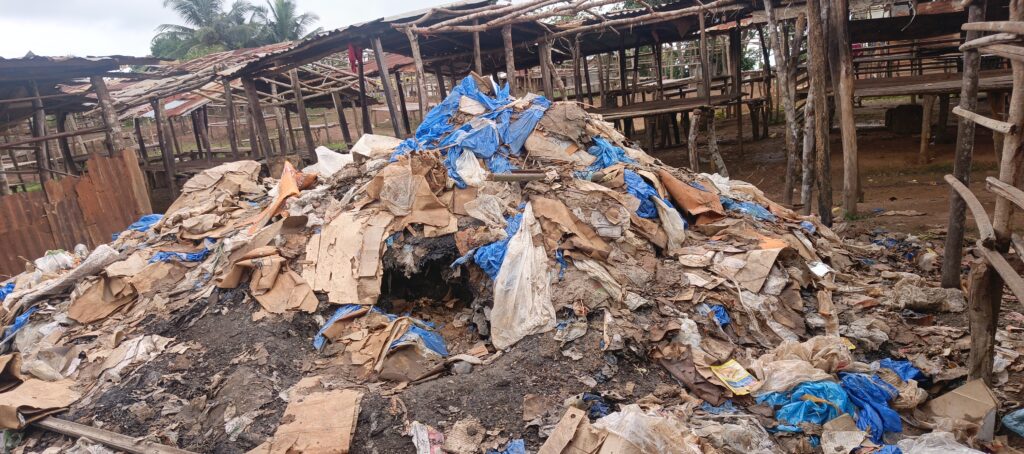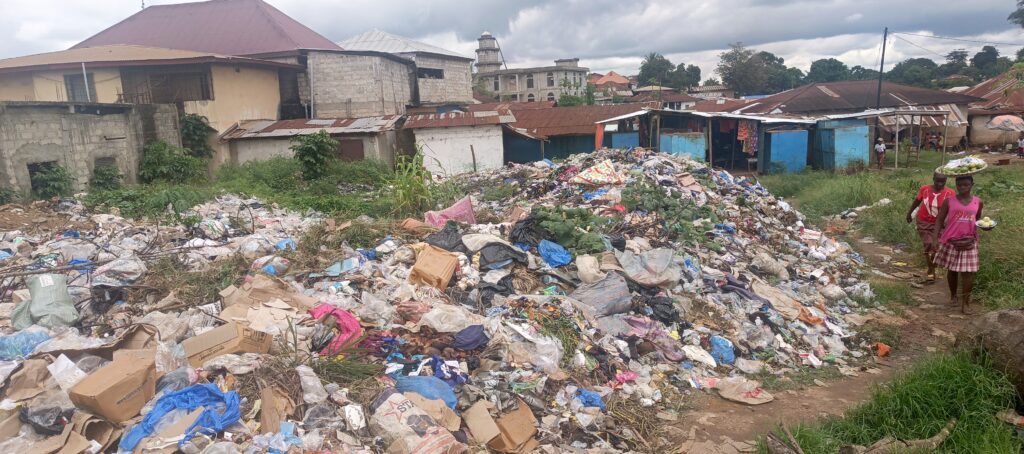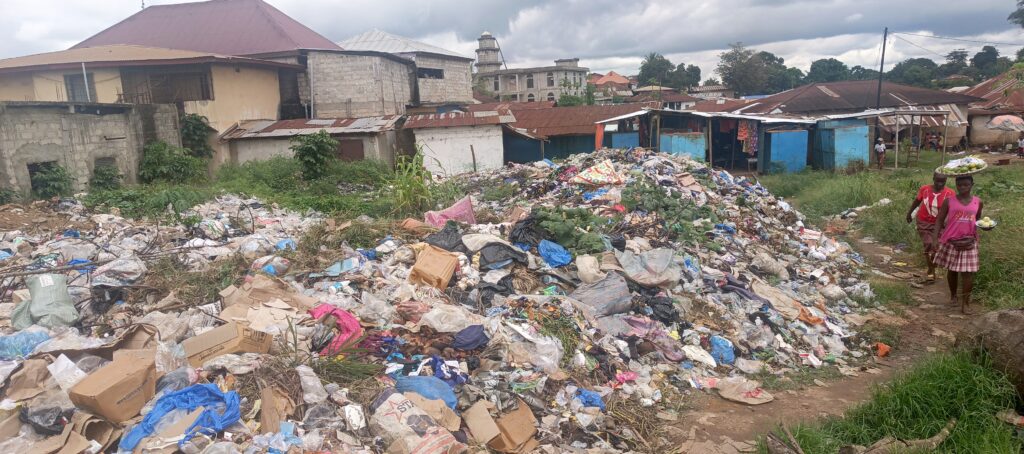By: Wilmot Konah / email: dadekolly20@gmail.com / Whatsapp: +231555666441
GBARNGA, Bong County -The state of sanitation in many Liberian cities, whether capitals or smaller established municipalities, remains troubling and increasingly dangerous. Across Bong County, especially Gbarnga, uncollected garbage is piling up in streets, marketplaces, and residential areas, creating breeding grounds for mosquitoes, rodents, and bacteria. Experts have postulated that open burning of waste is also releasing toxic fumes, affecting air quality and public health.
Authorities in majority of these cities have often attributed their unhealthy state to the lack of substantial government support. Some have decried their exclusion from national budgets while others say they have not been supported through local counties development funds.
City authorities have acknowledged residents’ criticisms about the existence of looming public health threats caused by the increasing level of improper waste management systems. They explained that there are “not many efforts” from the national government to address their concerns, despite repeated engagements.
From insufficient human resource development to the inadequate provision of logistics and lack of compensation for volunteers, inhabitants of the cities in Bong County are poised to keep being impacted by the effect of poor sanitation and environmental hazards if government does not step in urgently.
“Government is not contributing a dime for the upkeep of this city; we have tried our best, but we cannot do all by ourselves,” Francis Gbelawoe, Mayor of Suakoko City disclosed. “I cannot disagree with the residents that the city is unclean, the government needs to help us to make life better for our people,” he continued.
Like Suakoko City, Palala is one of the most famous cities in the county with an estimated population of over 7,000 inhabitants, also a major commercial hub in electoral district one. But Mayor Papa Kermue shares in the Suakoko scenario. He explained that since assuming the role of mayor in 2024, the government is yet to provide any support to enhance the operations of his office.
“Things are tough here with us as a city government; we don’t have what it takes to properly manage waste,” Kermue said. “The city is too large for us to solely rely on aid from residents,” he lamented.
These issues are not just being faced by smaller cities like Suakoko or Palala. Bigger cities are also confronted with similar problems.

Gallah Varpilah, the Mayor of Gbarnga City, has also voiced concerns about sanitation challenges in Gbarnga. He attributed the situation to limited support from the government. According to Varpilah, the city government received the sum of $10,150 United States dollars from the 2024 national budget and $5,000 United States dollars from the County Social Development Fund in 2025, but said the funds were used toward compensating volunteer workers and purchasing a few motorcycles, which according to him, are not sufficient to the challenges the city faces with waste management.
“We are challenged; currently, we are managing this city through aid and fees collected from business owners which are not sufficient to maintain sanitation in a big city like Gbarnga,” he said in live radio interview in the county. “There is a need for increased support to the city corporation.”
Lack of logistics: a major factor of poor sanitation
The worsening sanitation crisis in many Liberian communities is being largely attributed to the lack of essential logistics. According to mayors Gbelawoe, Varpilah, and Kermue, the absence of fundamental tools such as garbage bins, collection trucks, protective gear for workers, and proper disposal sites has severely crippled efforts to maintain a clean and healthy environment.
This logistical shortage, they said, has left their respective sanitation departments under-equipped to effectively carry out their functions. The Bong County mayors lamented that in some cases, waste goes uncollected for weeks due to the unavailability of functioning vehicles. Without these critical resources, even the best-laid waste management plans become ineffective, contributing to a buildup of garbage and breeding grounds for disease-carrying insects.
They are urging the government and development partners to invest in logistics, saying it is the foundation for any successful sanitation system.
“We can’t talk about hygiene if the workers have no tools,” Mayor Papa Kermue of Palala stated. “A whole big city like Palala doesn’t even have a single tricycle least to talk about pickup or truck.”
Residents decry the effects of poor waste management systems

Across these affected communities, residents are growing increasingly vocal about the daily struggles brought on by the situation. Many say trash is now part of the landscape, dumped along roadsides, in alleyways, and even near homes and schools. The stench from decomposing waste is overwhelming, and during the rainy season, clogged drainages worsen the situation by flooding neighborhoods with contaminated water.
Market women lament the decline in customer traffic due to the filthy environment, while others worry about long-term environmental damage if the situation is not intervened.
“Garbage is everywhere: nobody comes to collect it, and we’re left to burn it or bury it ourselves,” said Famah Pelemensae, a local vendor in Suakoko City. “This area is not better for us but we have talked too many times and no tangible intervention,” she continued.
The residents have renewed calls for both local and national authorities to overhaul the waste management system, starting with consistent garbage collection, proper waste disposal sites, and community awareness campaigns. Without urgent intervention, they fear the public health and environmental consequences could further go out of control.
Expert’s view
According to the World Health Organization 2024 World Malaria Report for Liberia, Liberia achieved a significant 44% reduction in malaria cases between 2017 and 2022, decreasing from approximately 1.8 million to 1 million cases but health expert Madicca Katakpah warns that despite reductions in malaria cases, the disease remains a leading cause of morbidity and mortality, accounting for a significant share of outpatient and inpatient healthcare consultations.
He further notes that prevailing sanitation issues in Liberia such as inadequate drainage, stagnant water, poor waste management, and limited access to clean water largely contribute to breeding mosquitoes, the major cause of malaria. These conditions significantly hinder the country’s malaria control efforts by maintaining high mosquito populations and increasing transmission risks, stating that improving sanitation, consistently administering vaccines, amongst other best practices, would further break the malaria transmission cycle.


